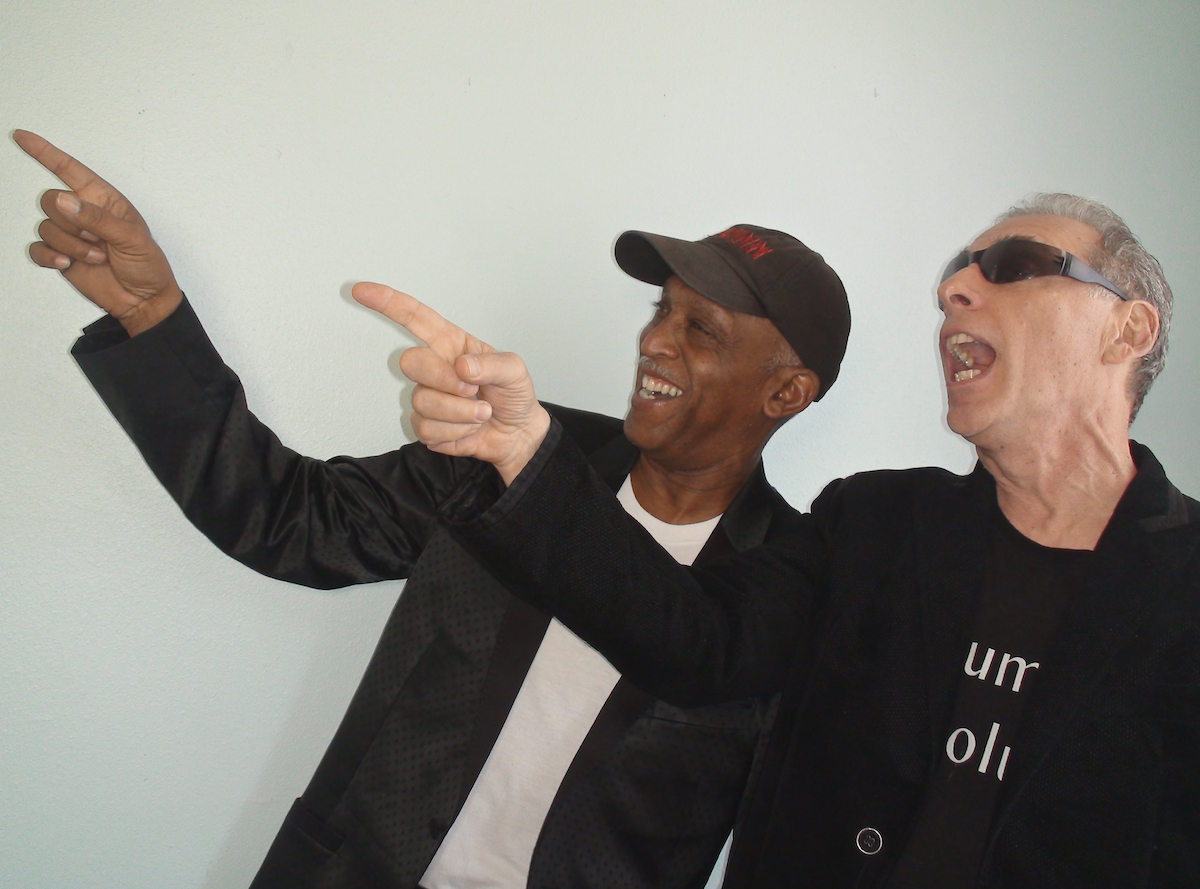
Inception to Mixdown: Original Headhunters Bill Summers and Mike Clark discuss the making of ‘God Make Me Funky’
During the early-to-mid-seventies, record making differed vastly to the process we know today. The domain was analog and the technology, less forgiving. The industry that revolved around those recordings was also very different: a pre-streaming era where record sales were a driving force and where the ‘insider’ knowledge that equips and empowers independent artists today, wasn’t as widely held. Record labels, producers, publishers and management firms were able to take advantage of artists, making tales of legal disputes and immoral deals alarmingly common, yet in spite of shady business, a wealth of brilliant, defiant and inspiring music was made.
The Headhunters’ 1975 album Survival of the Fittest is one such example. The pioneering jazz-funk group had found success two years earlier, uniting with Herbie Hancock to create the fusion masterwork, Headhunters. That record led to dealings with manager/producer David Rubinson, who was at the board when the group strode into Wally Heider Studios in 1975. The incredible story of its opening track, God Make Me Funky, is told here by revered percussionist Bill Summers, aka. Baba Eshubi, and irrefutably funky drummer Mike Clark, ahead of The Headhunters’ return to Band on the Wall on Tuesday 4th December. If you’re yet to hear about the track’s use prior to the album, how the final mix took shape and why it enticed so many hip-hop producers, we’ve all the answers here!
When you convened at Wally Heider Studios in 1975, was God Make Me Funky fully written and ‘road tested’, or was it a track that came together in the studio, as Survival of the Fittest Was being tracked?
Bill Summers: ‘Actually Paul Jackson had been working on this tune for a while. We decided to record it and each musician contributed towards its completion. It had been done live with the band before we recorded, if my memory serves me correctly.’
Mike Clark: ‘Paul Jackson and I wrote and recorded God Make me Funky in about 1971. It was written for Everett and Jones BBQ which was next door to the house that Paul and I lived in. Mrs. Jones asked to record a song to play on the radio station KDIA to advertise her food and they would play this in the background. People started calling in to ask what was that tune playing while the guy was talking about the food as they really liked it.’
The sudden shifts in groove and tempo throughout the track are ingenious. Did you enjoy pushing yourselves as a band and seeing where the groove might take you? Were those changes the result of jamming or something you’d thought about bringing to the track before recording it?
Bill Summers: ‘Our idea was that every song on the “Survival Of The Fittest” project be shared equally between all the members. Bill Summers, Paul Jackson, Bennie Maupin, Blackbird Mcknight and Mike Clark. Who knows what song is going to get the attention? We just knew that if one of us wrote most of any song that got recognised or received more airplay or popularity it would be best to share everything equally. God Make Me Funky was no exception. Some songs were written with all the band in mind. If I came up with an idea or did more work on a song it did not matter, it was all for one and one for all.
Paul had the lyrics and we all contributed aspects of the writing and the music. I remember one specific thing that I added to the composition. This was a rhythmic odd meter transition that modulated. I and Mike Clark set the groove up as an intro. This intro has been sampled by many Hip-Hop and Rap artists. The reason for this, the intro started with drums and congas. Mike and I created our own patterns to play. This was perfect for a rapper or producer to sample and use as a loop. Back in the early days of sampling machines like the SP12 and SP1200 by EMU had a short sampling time. You were lucky to get a few seconds of a clean drum and percussion passage without bass, keys , guitar or keys coming in on top of it. God Make Me Funky had an extended intro.’
Mike Clark: ‘Paul and I had a million spontaneous grooves we could play right on the spot and this is what happened, but the snares broke so the snare drum sounded like a tom tom. The producer motioned for us to keep going. I played the entire track on tom tom and when I thought naturally we would do another take they had me fix my snares then put took a metal wastebasket and put a microphone in it, played the track to the microphone and every time the snare hit a back beat the snares would pick up the beat and re record as more of a snare type sound. I thought that was insane and didn’t like the sound then or now plus it left out all the ghost notes so you are only hearing part of the beat. The rappers no knowing about snare sounds liked it and sampled it.’
The Pointer Sisters’ vocals on the chorus really pack a punch! At what point did you decide their vocals would be a good addition to the record?
Bill Summers: ‘We all had a great admiration for the Pointer Sisters. We were managed by the same person who happened to be David Robinson who managed Herbie and produced Headhunters and other Herbie and the Headhunters projects. Since we were in the same camp, rehearsed and recorded at the same facility it seemed like a perfect match.
We also, as studio musicians, performed on several Pointer Sister projects. I remember one song we did with them “Yes We Can Can” I believe that was the title.’
Mike Clark: ‘After we recorded it David Rubinson, a producer decided it would be good to add them to the track.’
Bill, are you playing both bells and hand drums on the track, or is it the timbre of the hand drum strike that results in that higher frequency in the groove?
Bill Summers: ‘I always over dubbed my tracks because the tracks for each instrument needed to be treated or processed separately. I would usually play multiple instruments simultaneously on live gigs.’
How involved in the mixing were you? David Rubison is credited as the mix down engineer, but did you have specific ideas about how you wanted the record to sound?
Mike Clark: ‘I tried to get Rubinson to listen to me about the drum mix but he refused so it is what it is.’
Bill Summers: ‘We as the Headhunters were very hands on. I know that I made sure to be around at every phase of the recording. Not only to have input but to learn more about the process. I was always thinking of the day when I would record my own solo projects. David Robinson was and inspiration and I learned much from observing him. He was always under my microscope. I did not care too much for his methods when it came to the treatment of the band because his sole interest was in Herbie Hancock, although we carried a lot of the load, he put us on the bottom of the list when it came to compensation and credits. Especially when it came to me as the percussionist. I was expendable and looked at as less than the bass player or drummer or horn player. Example, I did not get any writing credits or arranging credit on the now famous Headhunters recording with Chameleon, Vein Melter, Sly and Watermelon Man.
Watermelon Man and my contribution to it was major. The flute and vocal parts that I composed for that particular song were disregarded and I to this day get no residuals or credit for the writing I contributed to that historic piece or project.This was typical of the times. Herbie Hancock himself told me, after I mentioned the lack of recognition that I received, “Bill you’re just a percussionist.”
God Make Me Funky is one of the most sampled tracks of all time. Knowing that some samples go uncleared and that your work with David Rubison wasn’t greatly profitable for the band, have you managed to get your financial due for the track, over the past forty years?
Bill Summers: ‘Of course not. The reasons are many. One thing is catching the people who are stealing from you. In many cases we would discover the work after the Statute of Limitation expired. Also, the group was fragmented at times and if we were to clear a sample we all needed to agree on certain things. Getting this done proved to be difficult at times. There was a point where the group had disbanded and I was determined to keep the group alive. I continued to work with Herbie years after the group broke up. I was always encouraging Herbie to put the group back together and we did with the recording “Return Of The Headhunters” Unfortunately Herbie’s management at the time abused us and made it very difficult for us to get the money we deserved from the tour generated by the release of that recording. I am dedicated to the younger generation and I share as much information as possible with them. They do not need to ripped off as we were by insensitivity and greed. Because you are talented does not make you a good person. David Robinson nor Herbie lived up to their promises and we were never paid properly. I have no regrets because life is what you make it. I enjoyed every moment with Herbie because there is a greater truth and that is caring for your fellow man. I allowed myself to be used because I have a greater cause. Money aint everything.’
Mike Clark: ‘Certain band members made low ball deals without telling the rest of us and we have never been paid for our work. Paul and I shared the publishing with the rest of the band to show good faith and comradery.’







